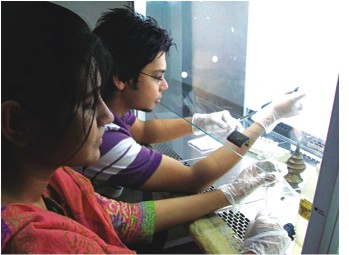Education
Delving into Life
Sameeha Suraiya
With the passage of time and its many demands, Bangladesh has seen the rise and fall in the popularity of quite a few fields in the academia. Subjects were pursued and sometimes, abandoned, with the emergence or the fall of a particular industry. Although the study of life sciences have long existed in our educational arena, its emergence as a sought after subject is particularly noticeable in the last few years, with more and more universities opening their own curriculum of the programme. Unravelling the many mysteries of life remain as the main objective of this vast field of study, and recent times have shown more and more Bangladeshi students drawn towards this discipline.
Due to its strictly research based nature, the need for proper laboratory facilities and the right research environment are mandatory for one to go ahead with its wonders, something that is difficult to attain for a developing country like ours, but the winds of change have surely taken hold. From the study of new medicines, to producing higher yielding crops, Bangladesh has made impressive breakthroughs. The recent discovery of the jute genome sequence instils the belief that all the potential is right here, just waiting to be unleashed with the right leadership.
 |
Research activities thrive in university laboratories today. Courtesy: Ekramul Kamal Ovi |
The department at NSU is relatively new but what is seen is evolution extraordinaire. Offering Bachelors and Masters in Biochemistry and Biotechnology, Microbiology, Pharmacy and Public Health, its labs try to meet the needs of hands-on learning experience, with more equipments being added. Graduating in Biochemistry and Biotechnology, Taha A. Razzaque stood as the valedictorian in the 2011 convocation. Talking about the relevance of his field, Taha comments, “Biotechnology is studied to make life easier in every possible way. While finding food high in nutrients can solve crises of world hunger, biotechnology can lead us to solutions to the most diverse problems.” He strikes a positive note when talking about the prospects in Bangladesh. “Nowadays, these subjects do not limit one to teaching and researching. With the growth of pharmaceutical industries like Beximco, Square, and not to mention the fine research institutes that we have, fresh graduates today have more opportunities to make use of their skills.”
Rifat Ara Begum is currently pursuing her Masters in Biochemistry and Molecular Biology at University of Dhaka (DU). For her, this indeed is the age of life science. “Research activities at DU are quite progressive. Of course, research is expensive but the show needs to go on. DU has its own independent projects running in the different laboratories.” She, however, wishes for a more widespread study of these programmes, suggesting that introducing relevant subjects at school would give students an understanding of this field beforehand.
 |
Recent times have shown more and more Bangladeshi
students drawn towards the discipline of life sciences. Courtesy: Rifat Ara Begum |
DU is perhaps one of the few universities that sees intense research taking place under its own supervision. According to Rifat, the professors in her department are in sync with the world outside; they are in touch with all the latest publications from around the world. One such professor, who for many years has been working tirelessly, upholding the idea of research with absolute dedication, is Professor Haseena Khan from the Department of Biochemistry and Molecular Biology. Apart from teaching, she supervises her own laboratory, giving students the opportunity to learn through research, something she wants to see more of. The flourish in research activities in the academia has prompted USAID and the US Department of Agriculture to fund the programmes at universities. Khan says, “This science is anything and everything to do with life.” She looks forward to more researches on diagnoses of diseases as well as drug use according to the genetic makeup for the Bangladeshi population. “What might be holding us back is the mindset towards research. Since there is no incentive for research in our country, students leave soon after they graduate as they are deprived of the singular most important aspect -- the right environment for research.” Talking about the pool of fresh minds she nurtures under her close supervision, Khan talks about how these students are her sources of inspiration. “They work like a magnetic pull for me. The Molecular Biology Lab at DU has a wonderfully stimulating atmosphere because of these students who are always full of ideas and questions."
Clearly, Bangladesh has the resources and quality minds to develop a subject like Life Science, however, lack of proper facilities and working conditions in various education institutes forces researchers to step back and bear with the unprofessional and incomplete environment. It is high time that the authorities look into the research facilities, both in the public and private universities, and build a generation who will have the courage to ask questions and the spirit to find the answers as well.
|
|
|
